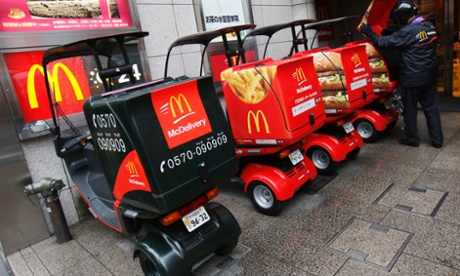
Around 20,000 dockworkers, working at 29 US west coast ports, are the men and women in charge of Christmas this year.
They are the people helping deliver toys to your nieces and nephews, tech gadgets to your grandmother and a car to you. And they are the same people accused of robbing Japan’s fast-food lovers of large portions of their favorite McDonald’s french fries.
These longshoremen have been in a labor dispute for the past seven months through their union, the International Longshore and Warehouse Union (ILWU), with their employers, represented by the Pacific Maritime Association, as they seek to renegotiate a six-year contract.
The talks have been dragging on much longer than usual – the longshoremen have been working without contracts since 1 July.
This labor dispute has been at the heart of a slowdown in west coast ports that many industry leaders – including the National Association of Manufacturers and the National Retail Foundation, who commissioned a study on this subject six months ago in trepidation of worker action – fear could cost them and the American economy billions of dollars.
Caught in the middle are America’s Christmas gifts and the McDonald’s french fries for Japan. Last Tuesday, McDonald’s announced that severe congestion at west coast ports affecting frozen potato exports from the United States into Japan had led to a fry shortage at over 3,000 of its Japanese branches.
ILWU’s grievances have not just been specific to targeted, dock-related complaints and happenings. They have also been observations about broader practices within the global economy: chiefly, soaring corporate profits and eroding workers’ rights.
Longshoremen, who are revered in the labor movement for their bravery, militancy and willingness to stand with other groups of workers, seem to possess a profound awareness of the key position they play within a shifting economy.
That’s why these talks are no (pardon the pun) small fry.
Longshoremen may sound like the bearded working-class heroes of a 19th-century novel, but they are in fact indispensable human cogs in a profoundly modern, fast-paced and intimately connected global economy, essential for the worldwide shipment of food and goods. West coast ports are the contemporary gateways to America for the world, including the US’s second-largest trade partner: China.
On the docks, longshoremen are responsible for loading and unloading millions of tons of cargo that pass through west coast ports each day – cargo that represents a staggering 12.5% of the economic value of America’s GDP, according to one study by Martin Associates.
That includes imports and exports of everything from cars and cornflakes to shoes and electronics.
If longshoremen don’t get a new contract, more than a few people will feel the ripples.
Another 10-day stoppage on the west coast like the one in 2002, when similar contract negotiations took place, could cost the American economy over $21bn, Martin Associates found.
As it stands, slowdowns have been reported across most west coast ports since July, but the story of the root cause varies drastically between sides.
Management claims dockworkers have been intentionally engaging in deliberate, short work stoppages and work-pace reduction, creating delays and backlog as ships and cargoes continue to pour in.
Mike Zampa, communications director with the port of Oakland which like other ports is only involved in this dispute insofar as it is an effective landlord, confirmed that workers had been engaging in such actions.
But the ILWU and its workers claim the backlog is due to mismanagement by employers who have focussed on cutting costs and maximizing volume to the detriment of worker safety and long-term productivity.
As ships and cargo capacity have continued to grow, workers say suitable equipment and logistical provisions have not been provided for – a view broadly backed by industry analysts.
Despite an on-the-job fatality rate higher than that of firefighters and policemen – with recent casualties including a woman crushed to death by a container and a man run over by a top-loader – the longshore trade remains a popular one.
Openings are rare and highly sought after. In 2012, when entry-level positions were made available in San Diego, 12,600 people applied for just 40 positions, according to the San Diego Port Authority.
The pay is promising in the long run, with “class A” workers earning over $100,000 a year and health benefits of the highest quality. But that of course is contingent on accruing the necessary hours and seniority.
Base pay is $25 to $35 per hour and is always done by the shift, with junior or “casual” workers – almost one-third of all ILWU members – rarely getting full-time hours.
Discussions between the two parties, details of which have mostly been closed to the media, are ongoing.
The french fries setback has led McDonald’s to take emergency steps, including exporting 1,000 tons of the food from the US by air. This sort of action is rare: the US almost strictly moves its overseas cargo volume by boat. McDonald’s will be limiting the size of its french fry portions in Japan for the foreseeable future.
Back at home, the dispute is providing a fascinating look into a potential future for an otherwise waning labor movement.
“The larger story here is about Walmart and Target, about their dominant economic positions and their ... reliance on export and import,” says Brishen Rogers, an associate professor of law at Temple University.
“Just imagine what would happen if longshoremen suddenly refused to unload Walmart goods. That’s the $50bn question.”

